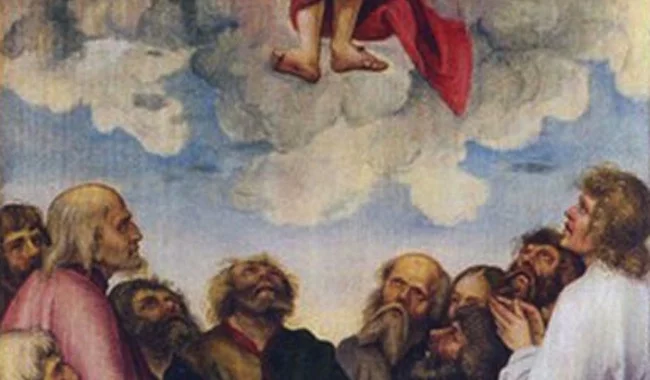Warum ist Christi Himmelfahrt der wichtigste Moment im Neuen Testament?
Mein Freund Ian Paul1 schreibt:2
Was würdest Du als Höhepunkt und Vollendung des Lebens und Wirkens Jesu bezeichnen?
Überraschenderweise ist dies keine triviale Frage. Einer der Hauptunterschiede zwischen dem Johannesevangelium und den synoptischen Evangelien besteht darin, dass die Synoptiker die Kreuzigung als einen notwendigen, aber unvollständigen Akt auf dem Weg zur Auferstehung darstellen, während Johannes sie als Höhepunkt und Vollendung des Wirkens Jesu an sich darstellt. Anstelle des Verzweiflungsschreis Jesu (Matthäus 27:46, Markus 15:34) zeichnet Johannes einen Triumphschrei auf: „Es ist vollbracht!“ (Johannes 19:30). Die Verheißung, dass „lebendiges Wasser“ aus dem Bauch oder der Seite des Gläubigen sprudelt (Johannes 7:38), am besten in Bezug auf die Tempelprophezeiung in Hesekiel 47 verstanden, wird durch das Blut und Wasser aus der Seite Jesu bei seinem Tod erfüllt ( Johannes 19:34). Kein Wunder, dass das wahre Zeugnis davon zum Glauben führt (Johannes 19:35).
Aber der größte Teil des Neuen Testaments würde auf die Auferstehung als Vollendung hinweisen. Die theologische Verknüpfung des Todes und der Auferstehung Jesu durch Paulus mit unserer Bewegung in und aus dem Wasser der Taufe (Römer 6:3-4) legt nahe, dass Kreuzigung und Auferstehung zusammengehören, und dies wird in der gesamten Verkündigung dessen, was Gott getan hat, deutlich. Diesen Jesus, den ihr gekreuzigt habt, hat Gott von den Toten auferweckt, erzählt Petrus der Pfingstmenge in Apostelgeschichte 2, und wir sind Zeugen davon. Paulus spricht in der parallelen Beschreibung seines Dienstes durch Lukas auch von „Jesus und der Auferstehung (anastasis).“ (Apostelgeschichte 17:18), so sehr, dass seine Zuhörer denken, Anastasis sei das weibliche Gegenstück zu dem männlichen Gott Jesus. Paulus fasst das Evangelium für die Korinther wie folgt zusammen: „Christus starb für unsere Sünden … wurde begraben … und wurde am dritten Tag auferweckt“ (1. Korinther 15:3-4).
 Doch der größte Teil des Neuen Testaments sieht tatsächlich ein drittes Thema als wesentlichen Teil und Abschluss des Werkes Jesu: die Himmelfahrt. Vielleicht übersehen wir dies aufgrund unserer theologischen Tradition, aber oft übersehen wir es, weil wir nicht sorgfältig genug lesen. In der Pfingstrede des Petrus ist der Höhepunkt dessen, was Gott in Jesus getan hat, nicht die Auferstehung, sondern die „Erhöhung Jesu zur Rechten Gottes“ (Apostelgeschichte 2:33). Zur Untermauerung dieser Aussage zitiert er Psalm 110, den am häufigsten zitierten Psalm im Neuen Testament (nimm Dir einen Moment, um das zu verinnerlichen …), in dessen Bildern „der Herr“ (Messias) seinen Platz zur Rechten des „Herrn“ (Jahwe, der Gott Israels) einnimmt.
Doch der größte Teil des Neuen Testaments sieht tatsächlich ein drittes Thema als wesentlichen Teil und Abschluss des Werkes Jesu: die Himmelfahrt. Vielleicht übersehen wir dies aufgrund unserer theologischen Tradition, aber oft übersehen wir es, weil wir nicht sorgfältig genug lesen. In der Pfingstrede des Petrus ist der Höhepunkt dessen, was Gott in Jesus getan hat, nicht die Auferstehung, sondern die „Erhöhung Jesu zur Rechten Gottes“ (Apostelgeschichte 2:33). Zur Untermauerung dieser Aussage zitiert er Psalm 110, den am häufigsten zitierten Psalm im Neuen Testament (nimm Dir einen Moment, um das zu verinnerlichen …), in dessen Bildern „der Herr“ (Messias) seinen Platz zur Rechten des „Herrn“ (Jahwe, der Gott Israels) einnimmt.
Wir können sehen, wie wichtig dies ist, sogar in der Theologie des Paulus. In seiner großartigen Hymne in Philipper 23 überspringt er tatsächlich die Auferstehung und geht direkt von Jesu „Tod am Kreuz“ zu seiner „Erhöhung in die höchste Stellung“ über. (Philipper 2:8-9). Es ist, als ob die Bewegung vom Tod zum Leben zur Herrlichkeit, in der Auferstehung und zum Aufstieg eine einzige Bewegung wäre – übrigens eine Bewegung, die sich in den Worten in Offenbarung 12:5 widerspiegelt, von dem männlichen Kind, „das die Nationen mit eiserner Rute regieren soll“ und zu Gott und seinem Thron entrückt wird. Im Johannesevangelium weist Jesus am Gartengrab darauf hin und sagt Maria, sie solle sich nicht an ihm festhalten, weil er noch nicht aufgestiegen sei. Und was am faszinierendsten ist: Die Evangeliumsbotschaft, die sie den Jüngern geben soll, lautet: „Ich fahre zum Vater auf.“ (Johannes 20:17). Auch für Lukas teilt sich das Wirken Jesu in zwei Teile, nicht bei der Auferstehung, sondern bei der Himmelfahrt:
In meinem früheren Buch, o Theophilus, habe ich über alles geschrieben, was Jesus zu tun und zu lehren begann, bis er in den Himmel aufgenommen wurde … (Apostelgeschichte 1:1-2)
Warum übersehen wir also die Bedeutung davon? Es läuft größtenteils auf ein Missverständnis von Daniel 7 und dessen Übernahme in das Neue Testament hinaus.
In meiner Vision sah ich nachts, und vor mir war einer wie ein Menschensohn, der mit den Wolken des Himmels kam. Er näherte sich dem Alten der Tage und wurde in seine Gegenwart geführt. Ihm wurden Autorität, Ruhm und souveräne Macht verliehen; alle Nationen und Völker aller Sprachen beteten ihn an. Seine Herrschaft ist eine ewige Herrschaft, die nicht vergehen wird, und sein Königreich ist eines, das niemals zerstört werden wird. (Daniel 7:13-14).
Obwohl Jesus die Formulierung „jemand wie ein Menschensohn“ auf sich selbst beziehet, handelt es sich bei Daniel um eine kollektive Figur; so wie die vier Tiere weiter oben in diesem Kapitel Personifizierungen der vier großen Reiche (babylonisch, persisch, griechisch und römisch) waren, ist diese menschliche Figur eine Personifizierung des Gottesvolkes, das derzeit von den Mächtigen unterdrückt und verfolgt wird, aber voll Vertrauen ist, daß Gott sie retten, in seine Gegenwart bringen, sie rechtfertigen und ihnen Macht und Autorität über diejenigen geben wird, die derzeit Macht über sie haben. Als Parallele zu den Visionen im ersten Teil von Daniel (die vier Tiere entsprechen den vier Teilen der Statue in Daniel 2) stellt es die Umkehrung der Macht dar, die Maria im Magnifikat beschreibt: „Du hast die Stolzen in der Vorstellung zerstreut.“ ihres Herzens“ (Lukas 1:51).
Indem er den Titel „Sohn des Menschen“ annimmt, beansprucht Jesus, die Bestimmung Israels zu erfüllen – seine Unterdrückung auf sich zu nehmen, aber auch die Rechtfertigung Gottes zu erfahren. Dies beinhaltet auch eine entscheidende Neuinterpretation: Nicht die Reiche dieser Welt sind die wahren Unterdrücker Israels, sondern die Mächte der Dunkelheit sowie ihre eigene Sünde und ihr Ungehorsam. Wenn also Johannes der Täufer „vor den Herrn tritt, um ihm den Weg zu bereiten“, geschieht dies durch „die Vergebung aller ihrer Sünden“ (Lukas 1:77).
 Aber das Wichtigste, was man in Daniel 7 beachten sollte, ist die Formulierung „mit den Wolken des Himmels kommen“. Dies ist nicht damit verbunden, dass irgendjemand vom Himmel auf die Erde kommt, sondern eher mit dem Gegenteil – der Erhöhung des Menschensohnes, der von der Erde zu dem kommt, der auf dem himmlischen Thron sitzt. Dies ist eine Sprache, die sich von Paulus’ Verwendung von „auf den Wolken kommen“ in 1. Thessalonicher 4:17 unterscheidet und ihr entgegengesetzt ist. Dies wäre für die Leser des Paulus sehr offensichtlich gewesen, da er für „Kommen“ einen ganz anderen Ausdruck verwendet, nämlich das Wort parusia , das „königliche Präsenz“ bedeutet.
Aber das Wichtigste, was man in Daniel 7 beachten sollte, ist die Formulierung „mit den Wolken des Himmels kommen“. Dies ist nicht damit verbunden, dass irgendjemand vom Himmel auf die Erde kommt, sondern eher mit dem Gegenteil – der Erhöhung des Menschensohnes, der von der Erde zu dem kommt, der auf dem himmlischen Thron sitzt. Dies ist eine Sprache, die sich von Paulus’ Verwendung von „auf den Wolken kommen“ in 1. Thessalonicher 4:17 unterscheidet und ihr entgegengesetzt ist. Dies wäre für die Leser des Paulus sehr offensichtlich gewesen, da er für „Kommen“ einen ganz anderen Ausdruck verwendet, nämlich das Wort parusia , das „königliche Präsenz“ bedeutet.
Wenn wir diesen Unterschied erkennen, können wir mehrere Schlüsseltexte der Evangelien entschlüsseln. Im Markusbericht über den Prozess gegen Jesus sagt Jesus zum Hohepriester:
Du wirst den Menschensohn sehen, der zur Rechten des Mächtigen sitzt und auf den Wolken des Himmels kommt (Markus 14:62).
Dies kann sich nicht auf die Rückkehr Jesu zur Erde („zweites Kommen“) beziehen, es sei denn, Jesus machte sich Illusionen darüber, wie bald dies geschehen würde. Aber was noch wichtiger ist: Dies kann schon deshalb nicht gemeint sein, da es sich hier um ein fast exaktes Zitat aus Daniel 7 handelt und sich auf die Thronbesteigung Jesu (des Menschensohns) und die Erfüllung der Bestimmung Israels bezieht. Aus diesem Grund betrachtete der Hohepriester es als Gotteslästerung: Tatsächlich wurde Jesus gekreuzigt, weil er seine Himmelfahrt erwartete!
Ebenso ergibt Matthäus 24 keinen Sinn4, wenn wir es nicht im Lichte von Daniel 7 lesen. Jesus sagt Folgendes voraus:
Zu dieser Zeit wird das Zeichen des Menschensohnes am Himmel erscheinen und alle Völker der Erde werden trauern. Sie werden den Menschensohn mit Macht und großer Herrlichkeit auf den Wolken des Himmels kommen sehen… (Matthäus 24:30)
Dann sagt er aber ganz feierlich: „Wahrlich, ich sage euch: Dieses Geschlecht wird gewiss nicht vergehen, bis dies alles geschehen ist“ (Matthäus 24:34). Sofern sich nicht sowohl Jesus als auch Matthäus (und diejenigen, die den Kanon sammelten) irren, muss dies bereits geschehen sein5 – und genau das geschah bei der Himmelfahrt. Jesus wurde in den Wolken des Himmels entrückt, um in Herrlichkeit zur Rechten des Vaters zu sitzen.
Die Lesung für den Himmelfahrtstag6 ist Apostelgeschichte 1:1-11, die umfassendste Darstellung des Augenblicks der Himmelfahrt Jesu im Neuen Testament. Dabei gibt es ein paar wichtige Dinge zu beachten.
Wir haben bereits bemerkt, dass es die Himmelfahrt ist, an der Lukas den Punkt der Trennung sieht zwischen „allem, was Jesus zu tun und zu lehren begann“ und dem fortgesetzten Dienst der Apostel, in dem Jesus weiterhin handelt und lehrt durch den Heiligen Geist. Auffallend an diesem Bericht ist jedoch, dass die Lehre Jesu gegenüber den Aposteln, „die er erwählt hatte“, nur „durch den Heiligen Geist“ geschehen kann. So wie Jesus durch den Geist diente (und zwar nach seiner Prüfung in der Wüste „in der Kraft des Heiligen Geistes“, Lukas 4:14), so tut er dies auch nach seiner Auferstehung weiterhin und gibt den Aposteln selbst das Muster vor. Sie können seinen Dienst nicht fortsetzen, bis auch sie „mit Macht aus der Höhe bekleidet“ sind (Apostelgeschichte 1:8).
Dies ist eine Zeit „nach seinem Leiden“, was bereits als halbtechnische Bezeichnung für seine Übergabe, Prügel und Kreuzigung, seine „Passion“, erscheint. Man könnte meinen, dass die bloße Tatsache, daß er wieder am Leben war, ausreichte, um alle Fragen der Jünger zu beantworten – doch Lukas stimmt hier mit Matthäus’ Beschreibung überein, dass „einige zweifelten“ (Matthäus 28:17), da sie „viele überzeugende Beweise“ brauchten.
Die Formulierung „vierzig Tage“ ist in der gesamten Heiligen Schrift von Bedeutung. „Vierzig“ bedeutet eine Zwischenzeit des Wartens, der Prüfung und der Vorbereitung7, einschließlich der Zeit, in der es während der Sintflut regnete (1. Mose 7:4), der Exodus-Wanderungen (4. Mose 32:13) und der Lebensabschnitte des Mose (laut Stephanus in Apostelgeschichte 7: 23, 30, 36), Elia am Berg Horeb (1. Könige 19:8), Jonas Predigt nach Ninive (Jona 3:4) – und so weiter. Es ist oft die Zeitspanne zwischen großen Epochen in der biblischen Erzählung von Gottes Heilstaten.
Jesus lehrt weiterhin über das „Reich Gottes“, womit das zentrale Thema seiner Predigten in den Evangelien fortgeführt wird. Dies würde im jüdischen Kontext Sinn machen, wo Gott als „König“ betrachtet wurde und die eschatologische Hoffnung auf die Manifestation seiner Herrschaft als König über Israel – und die ganze Welt – bestand. Aber es fällt auf, dass im weiteren Verlauf der Apostelgeschichte und in den uns vorliegenden Schriften des Paulus die Sprache des Reiches den zweiten Platz einnimmt gegenüber anderen Sprachen der Auferstehung und Erlösung.
Das „Geschenk, das mein Vater versprochen hat“ spiegelt die johanneische Sprache aus der Abschiedsrede Jesu wider, die in jüngsten Lektionarslesungen untersucht wurde. Der Kontrast zwischen der Wassertaufe des Johannes und der Geistestaufe Jesu greift die Sprache des Johannes selbst vom Anfang des Lukasevangeliums (Lukas 3:16) auf, aber diese Paarung bildet auch ein Thema in der Apostelgeschichte, wo die Gläubigen beide mit getauft werden Wasser und mit dem Geist.
Die Frage in Apostelgeschichte 1:6 „Wirst du zu dieser Zeit das Königreich für Israel wiederherstellen?“ zeigt das anhaltende, nationalistische Missverständnis der Jünger über die Bedeutung des Königreichs – sie brauchten also wirklich diese 40 Tage der Belehrung! Anstatt sie direkt zurechtzuweisen, führt Jesus sie in eine andere Richtung; Der Geist wird sie dazu ausrüsten, seine Zeugen „bis an die Enden der Erde“ zu sein. Es stellt sich heraus, dass dies die Bedeutung der eschatologischen Erwartung des Alten Testaments ist, dass alle Nationen nach Jerusalem gezogen werden, nicht im physischen Sinne einer Migration, sondern im spirituellen Sinne, indem sie sich zum jüdischen Messias hingezogen fühlen, der dort gekreuzigt und auferweckt wurde. Dies wird auf dem Konzil in Apostelgeschichte 15 von entscheidender Bedeutung, bei dem es darum geht, der „Heidenmission“ einen Sinn zu geben, und spiegelt sich in der Vision der Offenbarung wider, dass Menschen aus allen Stämmen, Sprachen und Sprachen stammen.
Schließlich stellt der Engel eine explizite Verbindung zwischen der Himmelfahrt und der Erwartung der Wiederkunft Jesu her (im NT wird sie nie als sein „zweites Kommen“, gepaart mit der Inkarnation, sondern als seine „Wiederkehr“, gepaart mit der Himmelfahrt, beschrieben). Beim ersten Lesen könnten wir denken, dass der Zusammenhang sozusagen eines der Fortbewegungsmittel ist – er wird „auf dem gleichen Weg zurückkommen, wie Sie ihn gehen sehen haben“. Aber der theologische Zusammenhang ist viel bedeutsamer. Jesus besteigt den Thron Gottes, um „zu seiner Rechten“ zu sitzen und die Macht und Autorität Gottes durch den Heiligen Geist auszuüben. Wenn Jesus jetzt de jure Herr ist , muss er eines Tages de facto Herr werden . Seine endgültige Offenbarung als Herr über alles ist die unvermeidliche Folge seiner jetzigen Erhöhung zum Vater.
 Wenn also die Himmelfahrt im NT so wichtig ist, was bedeutet das?
Wenn also die Himmelfahrt im NT so wichtig ist, was bedeutet das?
- Autorität . Jesus thront beim Vater. Aufgrund der Himmelfahrt sitzt das geschlachtete Lamm mit Gott auf dem Thron und teilt seine Anbetung (Offenbarung 4). Bei der Himmelfahrt wurde ihm „alle Macht gegeben“ (Matthäus 28:18 ). Und diese Autorität bedeutet, dass Stephanus zuversichtlich ist, dass er von einer höheren Macht gehalten wird, sogar bis zum Tod – seine letzte Vision ist die von Jesus, der im Sinne von Daniel 7 aufgefahren ist (Apostelgeschichte 7:55-56).
- Menschwerdung . In der Menschwerdung trat Gott in die Menschheit, die menschliche Existenz ein. Bei der Himmelfahrt wird diese Menschheit in die Gegenwart Gottes aufgenommen. Wir haben einen Hohepriester, der für uns eintritt und nicht unfähig ist, Mitgefühl für unsere Herausforderungen, Dilemmata, Leiden und Schwächen zu empfinden ( Hebräer 4:15-16 ) .
- Verantwortung . Die Himmelfahrt markierte das Ende des irdischen Wirkens Jesu; Er hat uns nun die Verantwortung übertragen, diese Arbeit mit der Kraft des Heiligen Geistes fortzusetzen. Jesus ist nicht distanziert oder gleichgültig, aber er hat delegiert.
- Treue. Als Jesus in den Wolken zum Himmel aufstieg, versprach er, „auf die gleiche Weise“ wiederzukommen ( Apostelgeschichte 1:11 ). Seine Rückkehr wird im NT nie als „zweites Kommen“ bezeichnet, da sie nicht mit seinem „ersten Kommen“ (der Menschwerdung) gepaart ist, sondern mit der Himmelfahrt. Da Gott alles unter seine Füße gelegt hat, wird seine de jure–Autorität eines Tages eine de facto–Autorität sein.
 Ian Paul: Theologe, Autor, Redner, akademischer Berater. außerordentlicher Professor am Fuller Theological Seminary; Seelsorger in St. Nic’s, Nottingham, Verlagsdirektor von Grove Books; Mitglied der Generalsynode der Kirche von England. Macbenutzer; Schokoholiker. Auf Twitter und Facebook unter @psephizo zu finden. Blog: www.psephizo.com[↩]
Ian Paul: Theologe, Autor, Redner, akademischer Berater. außerordentlicher Professor am Fuller Theological Seminary; Seelsorger in St. Nic’s, Nottingham, Verlagsdirektor von Grove Books; Mitglied der Generalsynode der Kirche von England. Macbenutzer; Schokoholiker. Auf Twitter und Facebook unter @psephizo zu finden. Blog: www.psephizo.com[↩]- Englische Originalfassung hier auf Psephizo. Deutsche Übersetzung von Wolf Paul, unter Zuhilfenahme von Google Translate [↩]
- Ich bin übrigens nicht überzeugt, dass Paulus in Philipper 2 eine bereits existierende Komposition zitiert[↩]
- Ian Paul, Making Sense Of Matthew 24 (Matthäus 24 richtig verstehen) [↩]
- Ian Paul, What Matthew 24 Is All About (Worum es in Matthäus 24 eigentlich geht) [↩]
- Die Rede ist hier vom Common Worship Lectionary , der aktuellen Perikopenordnung für Sonn- und Feiertage der Kirche von England. Diese beruht auf dem im englischen Sprachraum unter protestantischen Kirchen sehr weit verbreiteten Revised Comon Lectionary, welches auch weitgehend mit dem Lektionar der röm.-kath. Kirche übereinstimmt[↩]
- Wikipedia-Artikel zur Zahl 40. Leider geht der deutsch Artikel nicht so detailliert auf die Bedeutung der Zahl 40 im Judentum (und daher auch im AT) ein.[↩]


